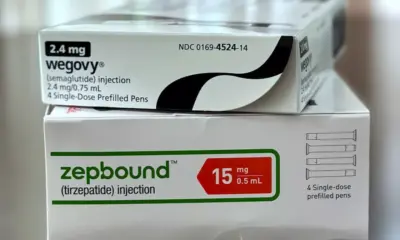Science
Premature Baby at MGH First to Receive Innovative Treatment

A baby born prematurely at Massachusetts General Hospital has become the first recipient of an innovative treatment designed for neonates. The girl, named Eloise Thompson, was delivered at just 25 weeks gestation, weighing less than one pound. Her mother, Julia Thompson, underwent an emergency delivery due to a severe diagnosis of early preeclampsia, which posed significant health risks for both mother and child.
Eloise’s birth is a significant milestone in neonatal care, highlighting advancements in medical technology available at MGH. The hospital is now utilizing this new treatment to improve outcomes for premature infants. According to MGH, this approach aims to provide critical support to newborns who face challenges associated with low birth weight and early delivery.
Emergency Delivery Due to Health Complications
Julia Thompson’s pregnancy was complicated by severe preeclampsia, a condition characterized by dangerously high blood pressure that can threaten both maternal and fetal health. This diagnosis necessitated an early delivery, as carrying the pregnancy to full term was no longer viable.
Following Eloise’s birth, the medical team at MGH implemented the new treatment regimen, which is still under evaluation but has shown promise in enhancing survival rates and reducing complications for preterm infants. The treatment protocol focuses on stabilizing the infant’s condition and supporting critical bodily functions in their early days.
Significance of Neonatal Advances
The case of Eloise Thompson reflects broader trends in neonatal medicine, where innovative treatments are transforming care for premature infants. Hospitals worldwide are increasingly adopting cutting-edge technologies to address the complex needs of this vulnerable population.
As medical research continues to advance, there is hope that treatments like the one used for Eloise will become standard practice, significantly improving outcomes for premature babies. This case at MGH not only underscores the challenges faced by preterm infants but also illustrates the potential for medical breakthroughs to enhance their chances of survival.
The journey for Eloise and her family is just beginning, but the early signs from Massachusetts General Hospital offer a beacon of hope for other families facing similar circumstances. The implementation of this new treatment could pave the way for future advancements in neonatal care, ultimately providing better health prospects for preterm infants.
-

 Technology5 months ago
Technology5 months agoDiscover the Top 10 Calorie Counting Apps of 2025
-

 Health3 months ago
Health3 months agoBella Hadid Shares Health Update After Treatment for Lyme Disease
-

 Technology6 days ago
Technology6 days agoOpenAI to Implement Age Verification for ChatGPT by December 2025
-

 Health3 months ago
Health3 months agoErin Bates Shares Recovery Update Following Sepsis Complications
-

 Technology4 months ago
Technology4 months agoDiscover How to Reverse Image Search Using ChatGPT Effortlessly
-

 Technology1 month ago
Technology1 month agoDiscover 2025’s Top GPUs for Exceptional 4K Gaming Performance
-

 Technology3 months ago
Technology3 months agoElectric Moto Influencer Surronster Arrested in Tijuana
-

 Technology5 months ago
Technology5 months agoMeta Initiates $60B AI Data Center Expansion, Starting in Ohio
-

 Technology5 months ago
Technology5 months agoRecovering a Suspended TikTok Account: A Step-by-Step Guide
-

 Health5 months ago
Health5 months agoTested: Rab Firewall Mountain Jacket Survives Harsh Conditions
-

 Health3 months ago
Health3 months agoAnalysts Project Stronger Growth for Apple’s iPhone 17 Lineup
-

 Lifestyle5 months ago
Lifestyle5 months agoBelton Family Reunites After Daughter Survives Hill Country Floods

















